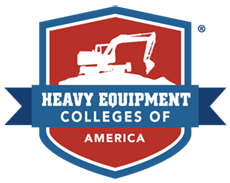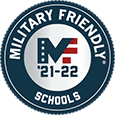Next Certificate Program Start: 06/06/2022 | Next Associate Degree Program Start: 07/05/2022
Next Certificate Program Start: 11/13/2023 | Next Associate Degree Program Start: 10/09/2023
CONSUMER INFORMATION AND DISCLAIMERS
START YOUR HEAVY EQUIPMENT TRAINING
ACCREDITATION
Heavy Equipment Colleges of America is accredited by the Accrediting Commission of Career Schools and Colleges (ACCSC).
Heavy Equipment Colleges of America – Georgia is recognized by the Accrediting Commission of Career Schools and Colleges (ACCSC) as a satellite location of Heavy Equipment Colleges of America – Oklahoma.
The Accrediting Commission of Career Schools and Colleges (ACCSC) is a recognized accrediting agency by the U.S. Department of Education.
JOB PLACEMENT
Heavy Equipment Colleges of America cannot guarantee employment or career advancement or any particular earnings or salary.
DEPARTMENT OF VETERANS AFFAIRS (VA)
The Department of Veterans Affairs is the government agency responsible for determining eligibility for VA education benefits and for authorizing payment for the benefits. If you have questions about the available benefits or your eligibility, please contact our admissions office at 888- 709-5007. You may also visit https://www.gibill.va.gov to learn more about the available benefits through the Department of Veterans Affairs.
CALIFORNIA LOCATION ONLY
Heavy Equipment Colleges of America is a private institution approved to operate by the California Bureau for Private Postsecondary Education. Approval to operate means the institution is compliant with the minimum standards contained in the California Private Postsecondary Education Act of 2009 (as amended) and Division 7.5 of Title 5 of the California Code of Regulations. (https://www.bppe.ca.gov/). Access all Catalogs, Student Performance Fact Sheets and Brochures here.
OKLAHOMA LOCATION ONLY
This school has a Certificate of Approval from the Texas Workforce Commission (TWC). The TWC-assigned school number is: S2698 . The school’s programs are approved by TWC, as well as Accrediting Commission of Careers Schools and Colleges (ACCSC). Heavy Equipment Colleges of America has a Certificate of Approval from the Texas Workforce Commission (TWC). The school’s programs are approved by TWC. Students must address their concerns about this school of any of its educational programs by following the grievance process outlined in the school’s catalog. Students dissatisfied with the school’s response to their complaint or who are not able to file a complaint with the school, can file a formal complaint with TWC, as well as with other relevant agencies or accreditors, if applicable. Information on filing a complaint with TWC can be found on TWC’s website at www.texasworkforce.org/careerschoolstudents.
Heavy Equipment Colleges of America endorses the national certification program offered by the National Commission for the Certification of Crane Operators (NCCCO) and provides training to prepare candidates for CCO examinations.
DEPARTMENT OF DEFENSE (DOD) SkillBridge
SkillBridge prepares service members for civilian employment through first-class apprenticeships, on-the-job training, job shadowing, internships and employment skills training. Service members are eligible to participate in a SkillBridge up to 180 days prior to separation. To be considered for an open seat in a SkillBridge you must contact the POC at the installation where you want to attend a SkillBridge and submit your commander authorized/signed participation memo in advance of the start date.
STATE AND FEDERAL GRANTS
WIOA/TAA funded training may be provided only to individuals who qualify for the program and not only if funds are available.
EEOC
Equal opportunity employer/program. Auxiliary aids and services are available upon request for individuals with disabilities.
STATE AUTHORIZATION RECIPROCITY AGREEMENT (SARA)
This complaint form applies to the following:
A student who attends a degree-granting institution that has a physical presence in the state of Oklahoma and/or
A student who attends an institution that 1) has its principal or campus or central administrative unit domiciled in Oklahoma and 2) is participating in the State Authorization Reciprocity Agreement (SARA).*
Students attending a public or private (not-for-profit or for-profit) institution should pursue concerns directly with the institution according to its dispute resolution or complaints policy. Dispute resolution or complaints policies are usually published in the institution’s catalog or student handbook and/or posted on the institution’s webpage.
If the institution has responded, but the student disagrees with the response, the student may elect to follow the institution’s dispute resolution or complaints policy for taking the complaint to a higher administrative level within the institution, such as the dean of the college or chief academic or student affairs administrator. It is important to examine the policy carefully in effort to know when the student has exhausted the appeals process.
If the student pursues the complaint via the institution’s formal procedures for complaints to the highest level possible and still perceives the concerns have not been adequately addressed, the student may file a complaint against a higher education institution in Oklahoma with the Oklahoma State Regents for Higher Education (OSRHE).
Complaints must be submitted on the official student complaint form (opens in new window). If the link does not open copy this into your browser and locate the form: https://www.okhighered.org/current-college-students/complaints.shtml OSRHE staff request permission to contact the institution on the student’s behalf to identify any possible resolution.
It is important to note that the student must have exhausted the institution’s complaint and appeal process before the OSHRE will to attempt to help the student identify any possible resolution with the institution.
*A student who attends an out-of-state SARA institution and has not had his/her issue resolved at the institutional level may be directed to the home SARA portal agency of the institution against which the complaint has been logged.
STUDENT COMPLAINT PROCESS
Oklahoma
If a student is enrolled in a postsecondary distance education course or program from an institution domiciled in Georgia that is approved to participate in the SARA program administered by NC-SARA and has exhausted all available grievance procedures established by the institution, the following complaint process can be used to submit a student complaint.
The complainant must follow the formal complaint or grievance process of the institution. It is important to keep records and documentation that provide evidence of the problem and the complainant’s efforts to solve it through the institution’s internal process. If, after exhausting internal grievance procedures, the institution of higher education has not responded to the complainant’s satisfaction or a satisfactory remedy has not been found, the complainant may contact GA-SARA for further investigation into the issue. In order for GA-SARA to initiate an investigation, the following must be true:
The student must have exhausted all available grievance procedures established by the institution of higher education. The student must complete the “Student Complaint Form” (below) and submit the form to GA-SARA. The student’s complaint must contain a detailed description of the claim, including dates, times and full names of all involved, as well as the actions taken by both the student and the institution to attempt to resolve the matter.
The Student Complaint Form must be electronically signed, attesting to the truth and accuracy of the complaint. The student recognizes that GA-SARA will not investigate anonymous complaints. By signing and submitting the Student Complaint Form, the student acknowledges that GA-SARA may share the information provided with the school, other relevant organizations, and individuals, in order to help resolve the matter in dispute. GA-SARA does not guarantee a student-acceptable remedy or resolution resulting from this submission or its investigation into the allegation.
Upon receipt of the completed and signed Student Complaint Form, GA-SARA will open an investigation if the matter being disputed falls within its jurisdiction. As appropriate, GA-SARA will conduct the investigation or refer the issue to another agency that is authorized to address the issue. All complaints will be handled as expeditiously as possible.
The student may be contacted during the investigation to submit additional documented evidence of the allegations against the institution, which may include copies of enrollment agreements, contracts, syllabi, receipts, financial aid notices, promissory notes, or relevant correspondences from the institution related to the complaint. Students should not submit original documents, as they may not be returned.
All parties will be notified in writing of the outcome of the investigation. If the complaint is outside of GA-SARA’s jurisdiction, it may be directed to the institution’s governing board, accrediting body, or to another agency that is authorized to address the concerns, if appropriate.
Students are reminded that they always have the right to seek advice from a private attorney. Students should be aware that submission of a complaint will be recorded and may be used for statistical reporting or other purposes.
To file a formal complaint regarding an institution domiciled in Georgia that is approved to participate in the SARA program administered by NC-SARA providing postsecondary distance education courses or programs, fill out the “Student Complaint Form” in its entirety and submit it electronically to GA-SARA.
Georgia
If a student is enrolled in a postsecondary distance education course or program from an institution domiciled in Georgia that is approved to participate in the SARA program administered by NC-SARA and has exhausted all available grievance procedures established by the institution, the following complaint process can be used to submit a student complaint.
The complainant must follow the formal complaint or grievance process of the institution. It is important to keep records and documentation that provide evidence of the problem and the complainant’s efforts to solve it through the institution’s internal process. If, after exhausting internal grievance procedures, the institution of higher education has not responded to the complainant’s satisfaction or a satisfactory remedy has not been found, the complainant may contact GA-SARA for further investigation into the issue. In order for GA-SARA to initiate an investigation, the following must be true:
The student must have exhausted all available grievance procedures established by the institution of higher education. The student must complete the “Student Complaint Form” (below) and submit the form to GA-SARA. The student’s complaint must contain a detailed description of the claim, including dates, times and full names of all involved, as well as the actions taken by both the student and the institution to attempt to resolve the matter.
The Student Complaint Form must be electronically signed, attesting to the truth and accuracy of the complaint. The student recognizes that GA-SARA will not investigate anonymous complaints. By signing and submitting the Student Complaint Form, the student acknowledges that GA-SARA may share the information provided with the school, other relevant organizations, and individuals, in order to help resolve the matter in dispute. GA-SARA does not guarantee a student-acceptable remedy or resolution resulting from this submission or its investigation into the allegation.
Upon receipt of the completed and signed Student Complaint Form, GA-SARA will open an investigation if the matter being disputed falls within its jurisdiction. As appropriate, GA-SARA will conduct the investigation or refer the issue to another agency that is authorized to address the issue. All complaints will be handled as expeditiously as possible.
The student may be contacted during the investigation to submit additional documented evidence of the allegations against the institution, which may include copies of enrollment agreements, contracts, syllabi, receipts, financial aid notices, promissory notes, or relevant correspondences from the institution related to the complaint. Students should not submit original documents, as they may not be returned.
All parties will be notified in writing of the outcome of the investigation. If the complaint is outside of GA-SARA’s jurisdiction, it may be directed to the institution’s governing board, accrediting body, or to another agency that is authorized to address the concerns, if appropriate.
Students are reminded that they always have the right to seek advice from a private attorney. Students should be aware that submission of a complaint will be recorded and may be used for statistical reporting or other purposes.
To file a formal complaint regarding an institution domiciled in Georgia that is approved to participate in the SARA program administered by NC-SARA providing postsecondary distance education courses or programs, fill out the “Student Complaint Form” in its entirety and submit it electronically to GA-SARA.
LICENSURE AND CERTIFICATION DISCLOSURES
Related to the Associate Degree in Heavy Equipment, Heavy Equipment Colleges of America has made every effort to ensure licensure and certification information is current. However, these regulations are frequently revised by state organizations. Therefore, before beginning a program with HEC it is recommended that you contact the state licensing board where you intend to seek employment to ensure the program will meet the state’s licensing requirements. Completion of any program at HEC does not guarantee employment, licensure, or certification in a given field. Please note that some employers and state laws require a criminal background check, which may disqualify an individual from obtaining licensure or certification. Membership with National Council State Authorization Reciprocity Agreements (NC- SARA) does not grant reciprocity or exemption from state licensing or certification requirements. Licensing and certifying requirements in Georgia may not be recognized as sufficient to obtain a licensor certification in other states.
LICENSURE AND CERTIFICATION DISCLOSURES
Related to the Associate Degree in Heavy Equipment, Heavy Equipment Colleges of America has made every effort to ensure licensure and certification information is current. However, these regulations are frequently revised by state organizations. Therefore, before beginning a program with HEC it is recommended that you contact the state licensing board where you intend to seek employment to ensure the program will meet the state’s licensing requirements. Completion of any program at HEC does not guarantee employment, licensure, or certification in a given field. Please note that some employers and state laws require a criminal background check, which may disqualify an individual from obtaining licensure or certification. Membership with National Council State Authorization Reciprocity Agreements (NC- SARA) does not grant reciprocity or exemption from state licensing or certification requirements. Licensing and certifying requirements in Georgia may not be recognized as sufficient to obtain a licensor certification in other states.
OPEN THE DOOR TO A NEW CAREER!
Locations
Quick Links
- Programs
- Certificate of Heavy Equipment Operations – Level I
- Certificate of Heavy Equipment Operations – Level ll
- Certificate of Heavy Equipment Operations – Horizontal Directional Drilling
- Certificate of Heavy Equipment Operations – Mobile Crane
- Certificate of Heavy Equipment Operations - Tower Crane
- Certificate of Heavy Equipment Operations – Lattice Boom Crawler Crane
- Certificate of Fixed Cab Crane Operation with Rigging and Signaling
- Associate of Occupational Science in Heavy Equipment
- Consumer Information and Disclaimers
- Online OSHA Safety Training
- Online General Safety Training
SMS Terms and SMS Privacy
Heavy Equipment Colleges of America offers our customers the option to engage in conversations with drivers to provide fast solutions. Message frequency varies. Message and data rates may apply. Text HELP to 702-867-5611 for assistance. Reply STOP to opt-out. Carriers are not liable for any delays or undelivered messages. No mobile information will be shared with third parties/affiliates for marketing/promotional purposes. All the above categories exclude text messaging originator opt-in data and consent; this information will not be shared with any third parties.




